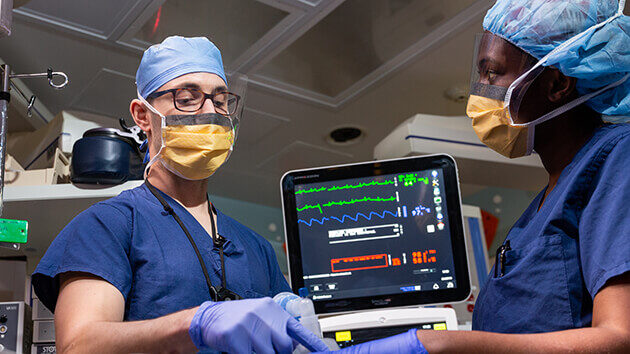The Greatest Advocate You May Have Never Heard Of

When Zach Feasel, CRNA, was in high school he had a unique opportunity. He was able to ask doctors, nurses and health care professionals of every stripe what they would do differently if they could go back and restart their careers?
As a participant in a medical careers program, he talked with people across a wide swath of specialties. “Surgery, dentistry, medical management—you name it,” he said.
“Sixty percent of the people I asked said they’d pursue a career as a CRNA,” he said. “At the time, I didn’t know what that was. I had to look it up.”
A CRNA, or certified registered nurse anesthetist, is an advanced practice provider who administers anesthesia to patients in every practice setting, and for every type of surgery or procedure, including OR procedures, podiatry, labor and delivery, trauma and private practice. Highly trained, these anesthesia providers attend to patients throughout the duration of their surgical or medical procedure. They are also skilled in emergency services, like airway management and administering central lines.
Feasel filed this information away and went off to Hobart College where he was drawn to the idea of a career in scientific research. But when he took a job as a home health aide to help pay his way through school, the close relationship he developed with his clients—an older couple who’d been in an accident—made him reconsider.
“I loved the friendship I had with them,” he said. “It made me think I might want to do something more closely related to patient care.”
He thought back to what all those medical professionals had told him in high school.
Inspired, he set out to become a CRNA, earning a bachelor’s in nursing and then amassing three years of work experience in intensive care units (the average for nurses aiming to pursue the degree). When the time came to apply to graduate programs, he targeted western New York (“I was living there at the time,” he said), but he also applied to the Center for Nurse Anesthesiology at Albany Medical College on a whim, because he’d heard good things about it.
Within a day of visiting the campus, he said, “I knew this was the place I had to be.”
He was struck by the faculty, the curriculum, the research opportunities, the supportive environment. “Every single member of the staff took time out to meet with me,” he said. “After each conversation, I became more and more convinced I wanted to come here. I’d never felt nervous about an interview before, but I was nervous about this one. I knew I really wanted it.”
The Center for Nurse Anesthesiology has been educating nurse anesthetists for 70 years and it currently enjoys the highest level of accreditation granted by the Council on Accreditation (COA). While there is a strong sense of tradition woven into this history, said the center’s director, Jodi Della Rocca, PhD, CRNA, the faculty and students are also very open to embracing change.
“Our field is continually evolving,” she said, “and we enjoy keeping pace with that.”
Della Rocca and her team are currently in the process of transitioning their curriculum from a master’s degree program to one that offers a clinical doctorate, in response to a national call from the COA that all nurse anesthesiology programs graduate only doctors of nursing practice starting in 2025. Programs in New York State, like Albany Med’s, will offer the doctor of nursing practice degree. “We’re admitting our first doctoral cohort next year,” she explained, “and we’re very excited.”
The new curriculum will introduce enhanced scholarly projects and other course work, while maintaining the same excellent clinical and academic training the program is known for, including in-depth research opportunities and 11 different clinical rotations across New York State and Massachusetts.
Feasel, who celebrated his acceptance into the program in 2015 and graduated with honors in 2017, calls it a “boutique program” and said he came out “remarkably prepared” to enter the field. “You’re trained in a very fast-paced environment and you’re introduced to everything—from simple procedures to lifesaving surgeries,” he said.
He liked it so much he decided to stay and practice in the OR at Albany Med, as do 75 percent of the center’s graduates. And he finds the relationship he has with patients the most rewarding part of his job. “I always tell patients, time flies when you’re under anesthesia,” he said. “It may seem like a blink of the eye to a patient, but you are with them from the very start of their procedure to the very end. Your job is to optimize conditions for the surgeon while constantly monitoring vitals and keeping the patient safe. You become their voice when they can’t speak for themselves.”
This aspect of the job is one of the reasons, Della Roca thinks, it remains such a well-kept secret in medicine.
“A lot of people don’t know what a CRNA is,” she said. “You tell the patient what you’re going to do. You explain you will be with them through their entire procedure—from pre-op to the PACU—and you are. You really are their advocate. Then they are anesthetized and they forget all about you. But we don’t forget about our patients and the satisfaction of providing a safe and patient centered anesthetic.”